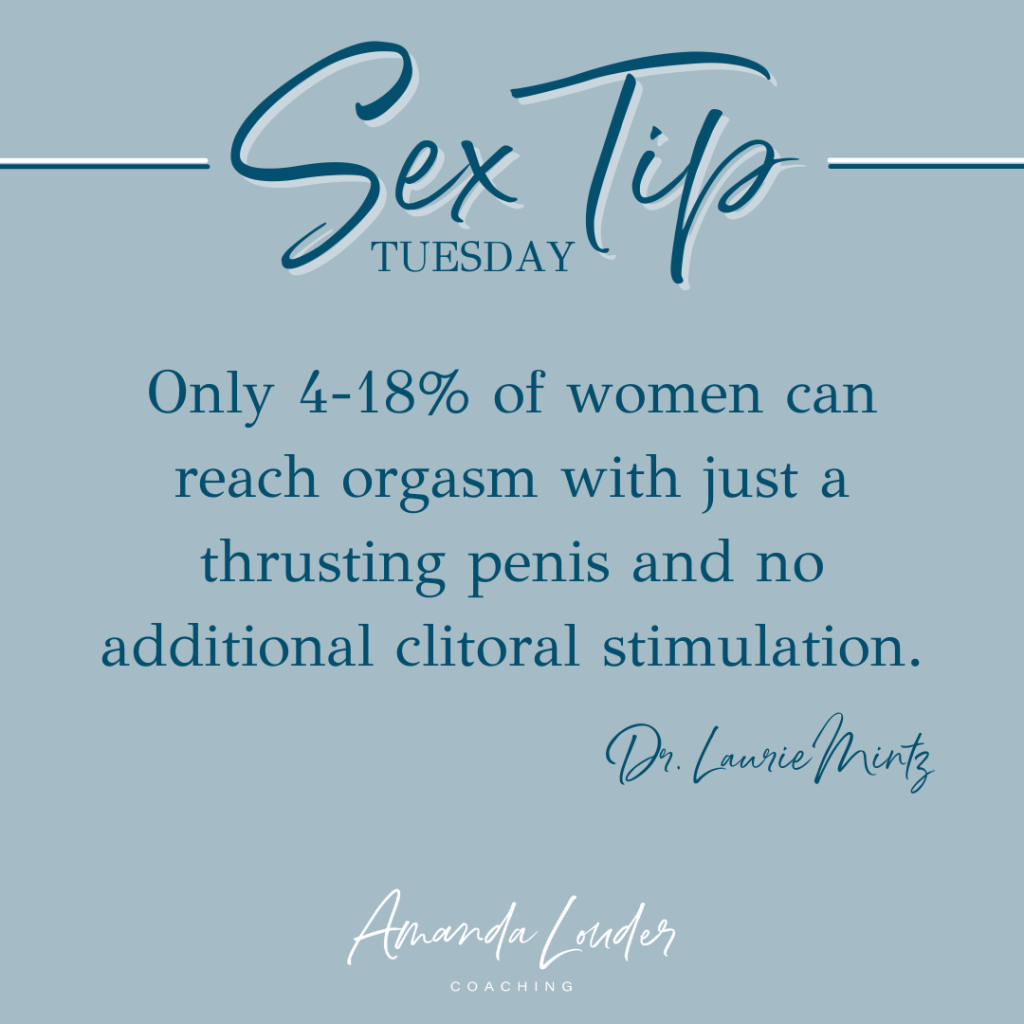
I often have women come to me wondering why they’ve never had an orgasm. I realize how frustrating it is for both the wife and the husband. I want to help! Why? Because pleasure is important! In this episode, we’ll talk about the 3 things to rule out physically that could be stopping you from having an orgasm. Then we’ll talk about the mental issues that could be keeping you from enjoying orgasms. These are things I help women with all the time. Maybe there’s something you haven’t thought of before.
Show Notes:
Follow Amanda on Facebook and Instagram.
Join Amanda’s Private Facebook Group.
References for this episode:
Sex & Psychology Podcast – Episode 145
Show Summary:
Today I want to share with you the top reasons why women don’t reach orgasm. Now this won’t cover EVERY woman, but from my experience, the things I will talk about in this episode are the things I see most often. I get a lot of women who come to me who have never had an orgasm and many of them are desperate for help. I can never guarantee that they will have one when they work with me, but I would say that almost every woman who has come to me with this desired result has gotten it.
Why do orgasms matter for women? Because experiencing pleasure is important. Experiencing this peak of pleasure is something that we were created for. It can be transcendent and euphoric. When you orgasm, a large level of the hormone oxytocin is released into your system, which is a powerful tool to help you create a stronger connection with your partner. In addition to the oxytocin, other hormones are released after an orgasm that have been shown to increase the amount of brain activity you experience. This means more focus, better sleep, less stress, and a better ability to think through problems.
In addition to the mental health benefits, there are also physical health benefits of orgasm. With orgasm, endorphins are released, which can impact how your body experiences pain. Orgasms have been shown to help with headaches (so no more using it as an excuse to not have sex!), menstrual cramps, as well as other kinds of pain. Orgasms and sexual activity are shown to lower risk for hypertension, rapid heart rate, and cardiovascular disease. After orgasming, the level of white blood cells in your body increase, which means that your immune system gets a boost for fighting off illness. Regular orgasms can also help with fertility by drawing in more sperm.
Orgasms are amazing! And if they are not happening in your marriage, then it can feel very frustrating for both parties. I was once talking to a friend about how many women come to me to finally have their first orgasm and she said “if you aren’t having orgasms, what’s the point.” Now, she said this very tongue in cheek, but many women and men feel this way. If women aren’t having orgasms they often don’t understand what the big deal is about sex and their desire levels can go down. Some may feel like they still want to have sex because they do see it as connecting, but some just shut it down all together. Many men feel frustrated with it as well. Often they are taking responsibility for “giving their wife an orgasm” and feel inadequate in their love making when this doesn’t happen. They want so desperately for her to have an orgasm and love sex as much as they do that it causes pressure which inhibits the orgasm even more, and that is if she is willing to even try.
So let’s talk about why orgasms aren’t happening. There are a few things we need to rule out very first.
First, if you are taking an SSRI (often found in antidepressant medications) then your chances of having an orgasm go way down. SSRI’s can not only reduce your interest in sex, they can make it difficult to become aroused, sustain arousal, and reach orgasm. Some people taking SSRI’s aren’t able to have an orgasm at all. If you are struggling with orgasm and are taking an SSRI, please speak with your doctor about the sexual side effects you are experiencing. These are normal and your doctor is used to hearing about them. There is no reason to feel ashamed or shy about it. Often the doctor can either change your medication to something that has less sexual side effects or add in an additional medication that reduces the effects.
Second, we need to rule out the possibility of a clitoral adhesion. What is a clitoral adhesion? It is where the head of the clitoris is stuck to the hood of the clitoris. How common is this? Rachel Rubin, MD a urologist and sexual medicine specialist said that helped with a research project where 23% of all women had mild, moderate, or severe clitoral adhesions. Wow! Why does this happen? Because, as women, we are not taught to care for genitals in the same ways that men are.
In the womb, both boys and girls genitals start out the same but develop into a penis or a clitoris depending on the genes. The penis and the vulva essentially have the same parts they are just arranged slightly different. The hood of the clitoris is akin to the foreskin of the penis. With an uncircumcised penis, doctors recommend foreskin hygiene starting around puberty. Without proper retraction of the foreskin, oils and skin cells can build up, and the hood can stick to the head of the penis and cause something called phimosis. Phimosis can be pain and can make erections, pleasure, and intimacy difficult. Pediatricians, primary care doctors, and urologists all know how to diagnose and treat phimosis. But no one is teaching girls and women to do this.
If it hurts or is uncomfortable to touch the clitoris, if you can’t orgasm or your orgasms feel weak or muted, there could be a clitoral adhesion. If you suspect that you might have one, please see your medical provider. Now chances are, they may not even know about it because even many OB/GYN’s and Urologists are not educated well on the clitoris. You can take this article, where I got this information from, with you to the doctor’s office to explain what is happening and the procedure, called clitoral lysis of adhesions, to help it. It’s a non-invasive procedure that doesn’t involve any cutting or stitching. But it has been found that the majority of patients reported improvement in pain, arousal, and the ability to achieve orgasm afterwards.
The third thing we need to look at is your hormone levels. Specifically your testosterone. Low testosterone can make it hard to orgasm. So please have your hormones checked by a doctor who specializes in hormones, not just your OB/GYN. While your hormones may fall in the normal range, they may not be normal for you.
Once we’ve ruled out those three things out the next thing we need to look at is stimulation. Now a lot of this is just proper education, which many women and men are lacking. So let’s do that.
According to studies, only about 4-18% of women can reach orgasm with just a thrusting penis and no additional clitoral stimulation. About 30% of women can not achieve orgasm with penetration. That means if you have been expecting to have an orgasm through intercourse alone and can’t, you’re normal! The majority of women need some sort of clitoral stimulation in order to achieve orgasm, whether that is manual stimulation (like a finger,) oral stimulation (through oral sex on her), or some sort of vibrator or toy.
We also have to look at how much time you are taking to stimulate. I have some women who come to me and say “I can’t orgasm!” and so we evaluate what is happening in the sexual relationship. And they proceed to tell me that they are kissing for like 5 minutes, he might touch her vulva or breasts for a few minutes, and then it’s straight to intercourse and then they are done. That is NOT going to cut it. Women typically need 15-20 minutes of foreplay (touching and kissing places other than the breasts and vulva) before they are aroused enough to want to be touched there. Now some women are different, so you really have to figure out what YOU like and communicate that to your spouse. Once sufficiently aroused it can then take another 15-20 minutes to come to orgasm with stimulation. Vibrators usually make the process shorter, but not always.
If time and not the right kind of stimulation are happening and there is still no orgasm, then we need to look at what is happening in the mind. This is really where coaching comes in. If you have issues with body image, thinking your genitals or body are gross or dirty, you are probably going to have a hard time having an orgasm. If you are worried about if you are doing it right, if you look ok, if your partner is having fun, you are probably going to have a hard time having an orgasm. If you feel guilty doing certain things or just having sex in general or you are shaming yourself, you are probably going to have a hard time having an orgasm. If you are not communicating with your partner what you need, you are probably going to have a hard time having an orgasm. If you are having relationship issues or don’t feel safe in your marriage or sexually, you are probably going to have a hard time having an orgasm. If you are having sex out of duty or obligation or to be a “good wife” you are probably going to have a hard time having an orgasm. I hope you get the picture. There is a lot that goes on in our mind that can keep us from having an orgasm. And all of this can be worked on in coaching.
Ok, so let’s summarize. There are some physical things that need to be checked on SSRI’s, anatomy, and hormone levels. Then there is stimulation, getting the right kind and for longer. And then there is the mental part.
So the solution is
- Make sure you know and understand your anatomy and how it works
- Figure out what works for you on your own and then you can share with your partner (and this doesn’t mean you have to bring yourself all the way to orgasm if you don’t want to, but you should know what feels good for you at least.)
- Understand mindfulness and how to change the way you think and feel during sex
- Use communication and creativity with a partner to let them know what works best for you.
And of course, I am here to help you through all of it in my Embrace You Elite Society Membership.





